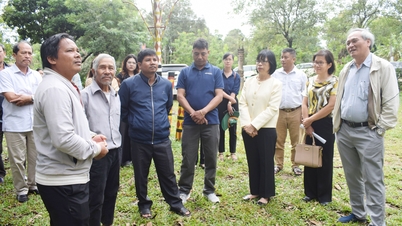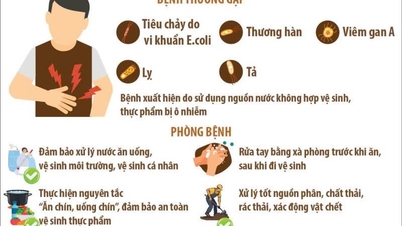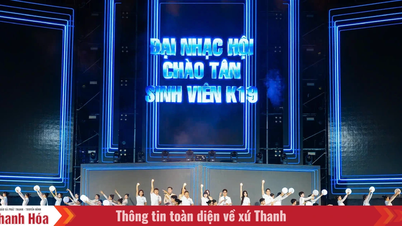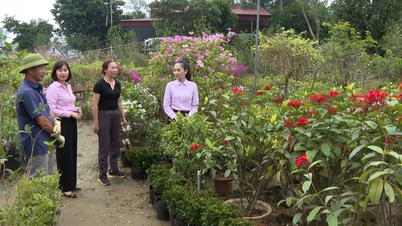
The player confidently answered right away, “For the morning glory.” However, the host saw that the answer was incorrect, so he suggested, “Two words, two words!”. The player still confidently answered, this time even more clearly, “For the morning glory to climb!”. But the host continued to be disappointed, “No, no!”, causing the player to look confused and frustrated, and then decided to “Skip it,” and the program’s answer was “morning glory” (Unfortunately, the ironwood tree sank/ When used as a fence post, the morning glory can climb).
So what's wrong in this situation?
1- "Cho bìm" is not wrong at all
The blank space in the text is represented by two ellipses (... ...): “Used as a fence post ... ... it climbed”. The player who filled in the two words “for the plover” is completely correct.
The version “let the morning glory climb” is recorded in books even more than the version “let the morning glory climb”. Specifically:
- The version "...cho iem no leo" (provided by the player) has up to 9 books (mostly compiled in Nom script and published before 1945) recording: 1- Poetry of the national anthem (Anonymous); 2- Quoc phong thi hop thai (author ton nghi - 1910); 3- Proverbs and folk songs (Pham Quynh - Hanoi 1932); 4- Thanh Hoa quan phong (Vuong Duy Trinh - 1903); 5- Proverbs and folk songs (Nguyen Van Ngoc - 1928); 6- Dai Nam quoc tuy (Ngo Giap Dau - 1908); 7- Nam am su loai (Vu Cong Thanh - 1925); 8- An Nam phong tho thoai (composed by Tran Tat Van); 9- Li hang ca dao (Anonymous),...
- While the version "...the morning glory climbs" (as the answer of the King of Vietnamese) was only collected in 2 books Nam giao co kim ly hang ca dao annotated (Anonymous - 1902-1905) and Hat phuong vai (Ninh Viet Giao - Culture Publishing House - 1961).
That alone is enough to confirm that the player was not wrong when answering "let the ivy climb".
However, at this point, an interesting question arises: why is the version "let the morning glory climb" recorded in more books than "let the morning glory climb"?
Idioms and proverbs are often concise, short, and succinct, with few words but many meanings. “What a pity the sunken ironwood tree/ Was used as a fence post for the morning glory to climb” is essentially a proverb in the form of a folk song. The word “bìm” here is an abbreviation of “bìm bìm” (like “The fallen fence, the morning glory climbs” - proverb; “Sắn bìm tí mệnh con con” / The green mold, how can it be square or round - Kiều).
The word “cho” in “cho bìm no leo” means to create a certain activity in the object. Therefore, if “Dem lam ty giau mai moi gai” is just a coincidence, random, then “Dem lam ty giau cho bìm no leo” implies intention and emphasizes the consequences. Accordingly, the version “cho bìm no leo” implies much more regret, blame, and condemnation. It is similar to the word “cho” in the cases of Hoai canh mai cho cua perch; Hoai hong ngam cho chuot voc/ Hoai hat ngoc cho ngau vui.
2- The answer is one thing, the suggestion is another
As written above, the blank space in the text is represented by two ellipses “Dem lam tym giau ... ... na leo”, meaning that two words need to be filled in. The player filled in the two words “cho bìm” which is completely correct. However, when he saw that it did not match the answer “bìm bìm”, the host suggested “Two words, two words!”. However, “bìm bìm” is one word, while “cho bìm” is the correct “two words”. So, because he could not distinguish between words and phrases, the host gave a suggestion that was completely opposite to the answer.
In short, "What a pity the sunken ironwood tree/ Was used as a fence post for the morning glory to climb" and "What a pity the sunken ironwood tree/ Was used as a fence post for the morning glory to climb" are two synonymous versions, in which the former is the original version, and is more popular than the latter.
Hoang Tuan Cong (Contributor)
Source: https://baothanhhoa.vn/cho-bim-khong-sai-269080.htm



![[Photo] General Secretary To Lam and National Assembly Chairman Tran Thanh Man attend the 80th Anniversary of the Traditional Day of the Vietnamese Inspection Sector](https://vphoto.vietnam.vn/thumb/1200x675/vietnam/resource/IMAGE/2025/11/17/1763356362984_a2-bnd-7940-3561-jpg.webp)



































































































Comment (0)